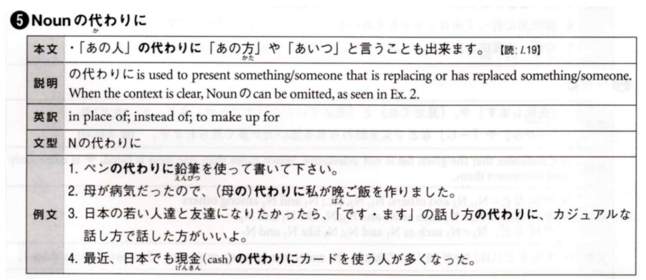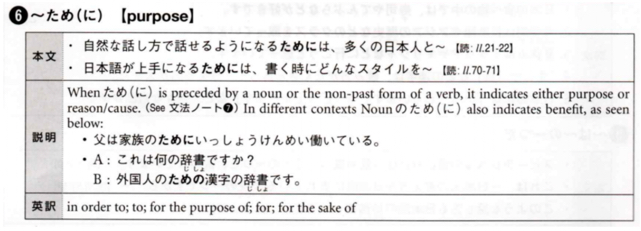上級へのとびら CH2−3(本文2) 中島敦「山月記」
”Sangetsuki (The moon over the mountain)”
by Atsushi Nakajima
Keywords:
文豪(ぶんごう) – great writer
唐の時代(とうのじだい)- Tou era
漢文(かんぶん) – Chinese story
日本語訳(にほんごやく)- Japanese translation
漢学者(かんがくしゃ) – Scholar of Chinese Classics
引き継ぐ(ひきつぐ) – to take over
親戚(しんせき) – relative
格調高い(かくちょうたかい)- elegant
端正(たんせい)- sophisticated
文体(ぶんたい)- writing
虎(とら)- tiger
国家試験(こっかしけん)- national exam
下級役人(かきゅうやくにん)- lower ranked business man
職に就く(しょくにつく)- get job
見下す(みくだす)- to look down
自尊心(じそんしん)- self-esteem
精神的(せいしんてき)に 追(お)い詰(つ)められる – cannot handle ones depressed feeling
駆け出す(かけだす)- to run into
理性(りせい)- mind as a human
蜘蛛(くも)- spider
遺伝子組み換え(いでんしくみかえ)- genetic recombination
怪しむ(あやしむ)- to wonder
臆病(おくびょう)- cowardly
自尊心(じそんしん)- pride
尊大(そんだい)- great
羞恥心(しゅうちしん)- arrogant shame
自意識(じいしき)-exoticism
見合う(みあう)- to match
偏屈(へんくつ)- stubborn
人と交わる(ひととまじわる) – to connect with people
個性(こせい)がある – unique
共感力(きょうかんりょく) – sympathy
引き込む(ひきこむ)- to attract
If you would like to do “Listening Challenge”, please do not read the transcript below!
ここまで書いてきて、次はどの作家について書こうか、と悩みました。
I had been wondering which writer I should write about next.
私の教えている日本語上級者レッスンのリスニングの練習用に今までの日本文学の話を書いてきましたが、メンバーさんの一人がこう言いました。
I write this Japanese literature series for the listening challenge for Advanced Japanese lessons, though, one of the member told me this.
「花子先生は、文豪ストレイドッグスというアニメをみたことがあるんですか?全員それに出ている作家ばかりですよ。」
“Teacher Hanako, have you read anime, “Bungo Stray Dogs”? All of your writing is about the cast of the anime”.
私はそのアニメのことは知りませんでしたが、どうやら明治から昭和初期の作家をキャストにして、話を書いたアニメのようでした。
I did not know about the anime, however, the casts of the anime are apparently Meiji to Showa era Japanese writers.
出てくる人々については、私が大学の日本文学科で勉強した文豪ばかりでした。
I learned about those writers in the lesson of Japanese literature major at my University.
アニメはフィクションではありますが、それぞれの文豪の性格やエピソードを入れたストーリーのようで、例えばはじめに実際には太宰治が自殺した川で中島敦が太宰治を助ける、というところなど面白いと思いました。
The stories of the anime are fictions, though, I thought it’s interesting that the stories include events which describe the writer’s characters, such as, Atsushi Nakajima saved Osamu Dazai in the river where Dazai actually committed suicide and died.
というわけで、その漫画の主役の中島敦から書いていきたいと思います。以降はそのキャストについて書いていきます。
So, I would like to talk about the main character of the “Bungo Stray Dogs”, Atsushi Nakajima followed by other casts of the anime.
彼の代表作には、「山月記」がありますが、それは大学で勉強したのではなく、高校の教科書に載っていました。
One of his popular writing is “Sangetsuki (The moon over the mountain). Actually I did not learn about it at University. It’s on my high school textbook.
中国の唐の時代の話だったので、中国人作家の漢文を日本語訳したものだと思っていました。
It’s about the story in Tou era in China, so I thought it’s Japanese translation of Chinese story by Chinese writer.
中島敦の父親は漢学者で、中学で漢文の教師をしていました。祖父も漢学塾を開いており、叔父がその漢学塾を引き継いだりと、多くの親戚が漢学に関わる仕事をしていました。
The father of Atsushi Nakajima was scholar of Chinese Classics and he taught Chinese literature. Grandfather also operated Chinese literature class, and one of uncle took over the business. Many of Nakajima family had job related Chinese literature.
その影響もあり、中島の作品は漢文調の格調高い端正な文体で知られています。
Because of that, Nakajima’s writing is known as a Chinese elegant and sophisticated writing.
山月記を簡単にいうと、中国の唐の時代、李徴という男性が虎になってしまう話です。
To put “Sangetsuki” simple, it’s about the man, Richo, turns to tiger in China during Tou era.
これだけだと「え?」と思いますよね。
You might say, “huh?” If you heard only this.
もうちょっと詳しいあらすじはこうです。
The further plot goes like this.
唐の時代の中国に李徴という男がいた。とても頭がいい男性で、若い時に難しい国家試験に合格したエリートサラリーマンです。
There was a man called Richo in China during Tou era. He was an elite businessman who was very smart that he passed national difficult exam when he was young.
彼はその仕事に満足せず、詩人で成功しようと仕事をやめます。しかし、上手くいきませんでした。
He was not satisfied with the job, so he decided to be successful as a poem writer, and quit his job. But it did not go well.
李徴は妻子を養うため再び下級役人の職に就くが、かつて見下していた連中が出世しているのを見て、自尊心はボロボロになる。
Richo returned to full time job as a lower ranked business man than before, though, people whom he looked down, have been promoted, so he was depressed since he had high-self esteem.
ある時、精神的に追い詰められた李徴は、夜中に野山へ駆け出したかと思うと、不思議なことに虎になってしまった。虎として、理性が徐々に失われる中、古い友人の袁傪に出会う。
One day, he could not handle his depressed feeling, and he ran into wild mountain middle of night, and turned into tiger for some reason. He was gradually forgetting his mind as a human, he saw his old friend Ensan.
はい、ここで高校のテスト。「李徴はなぜ虎になってしまったのか?」
Now, here is a question on quiz at high school. “Why did Richo turned to tiger?”
スパイダーマンなら、「蜘蛛に刺されて、遺伝子組み替えがされたからスパイダーマンになった。」と書くし、トワイライトなら、「彼女はバンパイヤに噛まれたからバンパイヤになった。」と書くところですが、李徴が虎に噛み付かれていないし、なった理由も書かれていません。
If it was about “Spiderman”, you might wrote, “A spider bit him and the genetic recombination made him Spiderman”, or if it was “Twilight”, you might say, “she became vampire because vampire bit her.”, however, any tiger bit Richou or there is no explanation why he turned to tiger.
虎になった李徴は、友人に語ります
Richo, who became tiger, talked to his friend,
「今までは、どうして虎などになったかと怪しんでいたのに、気が付いて見たら、自分はどうして以前、人間だったのかと考えていた。
“I had been wondering why I became a tiger, though, recently I started wondering why I was a human before.
誰かにこの苦しみがわかってもらいたい。しかし、獣たちは私の声を聞いて、怖がるだけだ。
I want someone to understand my struggle however, wild animals just get scared with my voice.
誰一人私の気持を分ってくれる者はない。」
Nobody understands my feeling.
高校のテストの正解は、
The correct answer of the high school exam is,
「臆病な自尊心と尊大な羞恥心が大きくなり、それが猛獣になった。つまり自分の醜い自意識がそれに見合う虎に姿を変えてしまった。」
The “cowardly pride” and “arrogant shame” get bigger and bigger, then, he became a wild animal. In other word, his ugly exoticism changed his figure to match inside and out.
妻子のことを考えずに詩人になろうとして失敗したところが、自分勝手で、偏屈で人と交わろうとしなかったため成功しなかった、とあります。
He was self-centered person that he tried to become a poem writer without thinking about his wife and child, and he was not successful since he was stubborn that he avoid connecting with other people.
今の時代だったら大体ビジネスで成功している起業家は、偏屈で人と交わらずに我が道を行ってるような気がします。みんなと同じじゃないから、個人で成功しますからね。しかしそういう人は、企業では上手くいかないことが多いです。
Nowadays, most successful entrepreneurs are stubborn and going their unique own way without connecting with many people. They are successful since they are different from average people. However, in most case, they don’t fit under the corporation.
どちらにしても、エリート企業の中で個性がありすぎて出世できなかったサラリーマンが読んだらとても共感する内容ではないでしょうか。
Either way, if a business man who is unique that they can’t blend in the elite corporation would feel sympathy on this story.
中島敦の文章は、人の共感力を得て引き込むのがうまいと思います。
Atsushi Nakajima is good at getting sympathy and make reader to be attracted.
ぜひ一度、読んでみてください。
Please read it once.
上級へのとびら CH2−3(本文2)
I recommend you to read these before watching lesson video.
スピーチスタイルには、「とてもくだけた話し方」から「とても丁寧な話し方」まで色々なレベルがありますが、どの部分が違うのでしょうか。次の文を見て考えてみましょう。
Among the speech styles, there are many different levels, from “very informal speech” to “very polite speech, “ but which parts are different? Let’s consider this while looking at the following sentences.
1)あいつ、どこ、住んでる?(男性が使うことが多い)
Where does that guy live? (Very informal)
2)あの人、どこに住んでるの?(女性が使うことが多い)
Where does that person live? (informal)
3)あの人はどこに住んでいますか?
Where does that person live? (Polite)
4)あの方(かた)はどちらに住んでいらっしゃいますか。
Where does that person live? (Very formal)
みなさんは今までに何番の言い方を勉強しましたか?
Which of these ways of speaking have you studies so far?
この四つの文を比べてみると、まず文末に使われている言葉の形で「くだけた話し方」か、「丁寧な話し方」かが分かります。
Comparing these four sentences, first of all we can tell whether a sentence is informal speech or polite speech from the words used at the ends of the sentences.
でも、違いは文末だけに表れるのではありません。
But the differences do not appear only at the ends of the sentences.
「どこ」を「どちら」にすれば、もっと丁寧な言い方になります。
If you change doko (where) to dochira (polite ‘where”), the phrase becomes more polite.
「あの人」の代わりに「あの方」や「あいつ」と言うことも出来ます。
You can also say ano kata or aits instead of ano hito.

1) Please write in pencil rather than pen.
2) My mother was ill, so I made the dinner instead.
3) If you want to make friends with young Japanese, you should use casual speech instead of the desu/masu form.
4) Recently, many people have begun using cards in place of cash in Japan, too.
じゃがいもの代わりに米を作りましょう。
そして、「どこに住んで るの?」と「い」を言わなかったり、「どこ 、住んでるの?」と「に」を落として言ったりすると、もっとくだけた感じになります。
Also if you drop the I sound saying “doko ni sunder no?” Or drop the ni saying “doko sunderu no”, it makes the sentence more informal.
自然な話し方で話せるようになるためには、多くの日本人と色々な場面で話したり、日本の映画やドラマを見て、どんな場面で、どんな人が、どんな相手に、どんな話し方をしているかをよく観察するといいでしょう。
In order to be able to speak naturally, you should talk to many different Japanese people in various situations and watch Japanese films and dramas, observing closely what ways of speaking are used in what situations, by whom, and toward whom.


1) To maintain my health, I make a habit of taking the stairs instead of the elevator.
2) I’m thinking of buying a JR Passs that I can travel around Japan cheaply.
3) This is a site created to help people practice their Keigo.
4) I want to work at a Japanese company in the future. To do that, I have to get better at Japanese.
旅行のため、たくさん暖かい服を買った。
次のページの「色々なスピーディレベル」の表を見て、言い方を比べてみて下さい。
Please look at the table “Various Speech Levels” on the next page and compare the different ways of saying things.